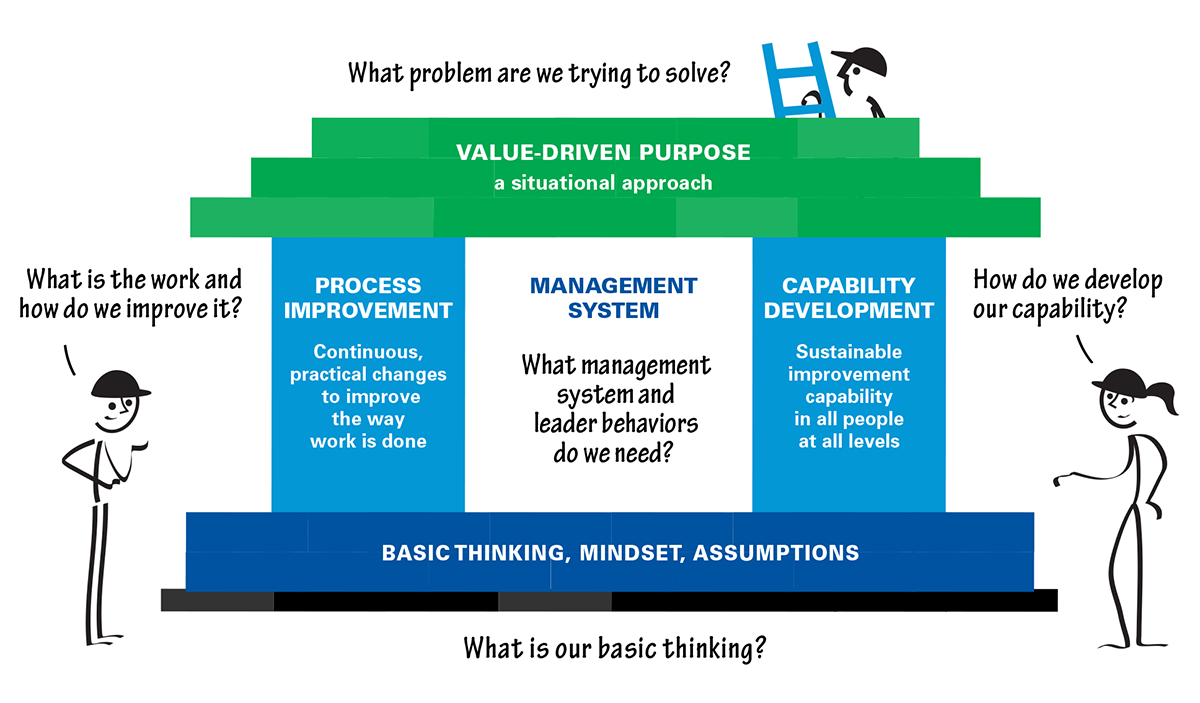You, your team, and your company are trying to keep up with ever-changing customer expectations and business conditions. You are doing your best to solve problems for basic stability, improve for elevated performance, and innovate for breakthrough impact. You are practicing lean thinking in everything you do.
However, you are struggling. You might say you are failing.
The Lean Enterprise Institute (LEI) has studied lean transformation for decades. We have learned that successful transformation requires addressing five questions:

- What is your value-driven purpose? What value do your customers need you to create? What problem(s) must you solve?
- What is the work exactly that needs to be done? How will that work be improved?
- What are the capabilities – knowledge, skills – that are needed? How will those capabilities be developed?
- What management system will monitor that work in terms of performance and improvement and develop those capabilities? What leadership behaviors will be necessary?
- What basic thinking, mindset, or assumptions will guide this transformation and new way of running the business?
LEI calls this set of questions “The Lean Transformation Framework.”
The questions are fractal — meaning that the questions apply to the enterprise level and the level of individual responsibility. So, anyone — from the CEO to the frontline supervisor — can use the Framework.
Critically, the Framework is not a roadmap. Every transformation is unique and requires a situational approach. By repeatedly answering these questions, you, your team, and your organization can develop its own successful path to transformation.
Learning Objectives
Through instruction, discussion, in-class and on-the-job exercises, participants will be able to:
- Develop a personal connection with the Lean Transformation Framework.
- Apply elements of the Lean Transformation Framework to scope the work of a provided example.
- Connect high-level goals with daily action (think globally; act locally) in a more nuanced case study.
- Define your own high-level goal and connect it with a manageable scope of work.
- Prepare a plan going forward based on an experiment run at your own work.
Who Should Attend
This session is ideal for executives, operations leaders, and continuous improvement leaders, who are eager to actively participate and explore together. If you prefer a more passive role and just want to receive answers, this might not be the right fit for you.
Structure of the Course
There will be five virtual group sessions with on-the-job activities in between sessions. View the agenda tab for more details and dates.
Week 1
1:00 – 3:00 PM ET
Monday, June 25
Tuesday, June 26
Wednesday, June 27
Session 1: Lean Transformation Framework overview
Session 2: Retail case study with practice
Session 3: Service case study with practice
2-hours each as full group
Week 2 and 3
Weeks of July 1 and Juy 8 times/days TBD
Session 4: How it applies to you. Choose 1 of 5 small groups.
1-hour each in small groups
Week 4
Week of July 15
Apply learning in your job at your convenience
2-4 hours individually
Week 5
1:00 – 3:00 PM ET
Tuesday, July 23
Session 5: Group reflection and planning next steps
2-hours as full group
Josh Howell
President and Executive Team Leader
Lean Enterprise Institute
Joshua Howell is president and executive team leader at the Lean Enterprise Institute (LEI). For over a decade, he has supported individuals and organizations with lean transformations for improved business performance. As a coach, he helps people become lean thinkers and practitioners through experiential learning, believing such an approach can lead to enterprise-wide improvement. Regular e-letters […]
Read more about Josh Howell

